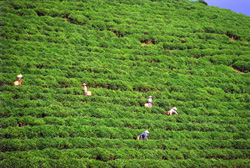 The soil, altitude, and prevailing weather conditions all affect the complex flavor of a tea. Thailand has over the years developed high quality teas the same way places such as California, Chile and Australia have over the years developed high quality wines - by bringing the plant varieties and know-how from overseas and improving on it.
The soil, altitude, and prevailing weather conditions all affect the complex flavor of a tea. Thailand has over the years developed high quality teas the same way places such as California, Chile and Australia have over the years developed high quality wines - by bringing the plant varieties and know-how from overseas and improving on it.Following the Chinese revolution and the defeat of the KMT at the hand of the Chinese communist party in 1949, thousands of KMT soldiers and their families were forced to flee China. At the welcoming of the Thai government, many of the Chinese ex-KMT soldiers and sympathizers were invited to settle in the Northern part of Thailand. In doing so, these Chinese migrants also brought with them their language, culture and many traditions including their love for the cultivation and making of teas.
In the 1980s, Taiwanese tea experts from the Taiwan Tea Agricultural Research center were invited to Thailand to assist upgrade the tea plantations originally set by the Chinese migrants. The Taiwanese experts brought with them high-quality tea plant hybrids that had been developed by the center as well as the processing technique specifically developed to produce quality High Mountain Oolong teas for which Taiwan is renowned.
Our tea masters took charge from there and continued with the tradition. Benefiting from the rich soil and ideal weather conditions of Doi Tung and Doi Mae Salong mountains, they maintained the high-quality hybrids in tea gardens located at an altitude of more than 1,200 meters above sea level which remains an essential factor in producing what many connoisseurs consider the ultimate in Chinese tea, Organic High Mountain Oolong teas. The teas have a subtle floral aroma and a deep rich flavor that is satisfying, refreshing and endlessly complex.


No comments:
Post a Comment